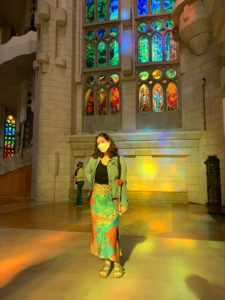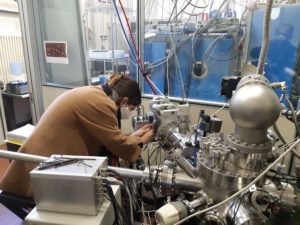
Anika Padin, S’23, is taking over our Instagram account Tuesday, March 8 from Milan, Italy. She is participating in the Wednesday, March 9, Good Power of Science: Women in Science event as well. Follow along as she shares her Northeastern experience!
Look back at her takeover experience here!
Tell us your major and projected graduation date.
I am a third-year applied physics major with math and electrical engineering minors. I’m planning to graduate in the spring of 2023.
Why did you decide to enroll at The College of Science at Northeastern and pursue physics?
I fell in love with physics some time in high school, from watching science-y YouTube videos and documentaries. I thought it would be so cool to be at the front of the physics research field, figuring out how the world works. I had decided on Northeastern during a visit to campus for newly admitted students. We were divided up by major to hear what each department offered. Professor Toyoko Orimoto gave an excellent presentation about her work with the European Council for Nuclear Research (CERN) and mentioned how she and her colleagues send students there (in France!) each year for co-op. The fact that I could potentially work on one of the most significant scientific collaborations in the world blew my mind.
Why a major in Applied Physics with minors in Electrical Engineering and Mathematics? What do you hope to do post-graduation with this educational experience?
My major in applied physics was initially a compromise between physics and engineering since there are so many options with minors and combined/double majors depending on your level of interest. I knew I didn’t want to do a combined major because those focus more heavily on engineering, and I was more interested in physics. The applied physics major is different from the physics major in that some requirements are dropped and replaced with “technical electives” — basically any STEM class above a 2000 level. I’ve used my technical electives to explore my other interests and pick up new skills.
My explanations for my minors are much shorter. I grew more interested in electrical engineering during my first co-op at E Ink, so I decided to tack on a minor to learn more and become more proficient in those skills. And I only needed to take one extra class to get a math minor since so many math classes are required for my major.
Upon graduation, I plan to go straight into the workforce. I want to take an engineering or engineering-adjacent position, maybe starting at the technician level. I’m open to working in almost any industry, but I’d love to do something impactful with my career, like in clean energy or biotechnology. I may pursue graduate school later on, but right now, I think I’m going to need a break from school for a while.
What are you involved with on campus? How can other students get involved in these initiatives?
As vice president this year, I am most involved with the Society of Physics Students! We facilitate co-op talks from physics students, hold social events, host talks from professors and employers, and foster a growing mentorship community. Anyone with interest in physics is welcome to attend meetings. If you’re looking to get involved, everything you’d need is on our Linktree. I recommend signing up for the newsletter and joining our Slack workspace — both are great resources!
Tell us about your experience working with Professor Louise Skinnari and her group.
During the summer and fall of 2021, I completed part-time research under Professor Skinnari for the CMS experiment at CERN! For my project, I researched improvements on the track trigger in the CMS detector. Millions of particle collisions happen each second in the detector, so the data from very few of those collisions can be stored on CERN’s computers. I ran simulations under different conditions to decide which data should be saved. We were specifically interested in accurately tracing the paths of particles based on which layers of the detector they pass through and whether that path would be expected due to the collision.
I completed this position remotely since I was taking classes that fall. I had a great time working with Prof. Skinnari and her group; they’ve all been so supportive and encouraging. As a result of this position, I also realized that I prefer doing more hands-on research than computer and simulation work.
I’d also like to share that I could do this work because I received the Undergraduate Award for Women in Physics from the Northeastern physics department! More information on this award and others from the department is available here.
You’re a recipient of the 2021 Advancing Women in Science Scholarship. Tell us about this recognition.
The Advancing Women in Science scholarship is awarded annually by the College of Science to second-year female undergraduates, with the goal to, in Dean Hughes’s words, “to expand opportunities for experiential learning that students may not otherwise have access to (e.g., unpaid research experiences, Dialogue of Civilization courses, international coop positions, etc.).”
I was nominated anonymously for the award, but anyone is welcome to apply as of this year. I feel so incredibly fortunate to have been selected for this award, and I’m happy that such an award exists to support other women in science!
You’re currently in Italy on a global co-op. Tell us about your experience so far.
I’m, using my Advancing Women in Science scholarship toward this exact experience! I’m completing research on the electrical properties of nanoparticles at the University of Milan. So far, most of my work has been using a scanning tunneling microscope (STM) to image and measure different samples and materials. STM is a fairly new microscopy technique based on the quantum tunneling effect. A metal tip drives a current through many points on the sample, and the STM can tell how far away an object is by how much the tip must move for an electron to tunnel through the object. The final image is created from a map of all these distances.
I am currently living in Milan, and I will be here through June. I’ve had a great time meeting other students, getting to see Italy, and learning about a completely different culture. The adjustment process has definitely been a bit of a struggle, but I am working through it and practicing a lot of self-care as I navigate this new chapter.
In the photo above, I’m working on equipment in the lab. We were making changes to the machine that deposits nanoparticles on the samples used in experiments.
How do you believe this co-op will enhance your overall Northeastern experience?
I think global co-op adds another layer to experiential learning. While anyone on co-op will learn new things on the job, I am learning new things about Italian culture and lifestyle 24/7. I’m excited to bring these experiences back to Boston with me.
What advice do you have for fellow Huskies hoping to pursue a global co-op or study abroad?
My most significant piece of advice would be to keep in mind that there’s so much you cannot prepare for. As much as I wanted to organize every bit of my preparation, I couldn’t know ahead of time how I would react to things like learning to navigate the city, forgetting how to say some things in Italian, and not being able to get my favorite foods so easily.
That all being said, there are many things that you can prepare for! I recommend reaching out to other students who have studied at the same university, gone on the same co-op, or even just lived in the same city or country. While advisors are also helpful, there’s a lot about the process they can’t speak for because they haven’t experienced it themselves. The people I connected with who had studied in Milan were happy to help me because they didn’t want me to struggle in the ways they did.
Also, if English is not the predominant language in your country of interest, I recommend starting to learn the language as soon as you can. While you don’t always need to know very much, the sooner you start, the better you’ll be at retaining everything you’ve learned.
At times, continuing your education and global experiences amid the pandemic can be challenging. So how do you focus on your well-being and future goals during all of this?
This is an important question, but I want to mention that the growth and healing processes are so different from person to person. I can’t give universal advice since we are all experiencing this pandemic so differently, but I can share what has helped me.
As wonderful and beautiful as it is to be abroad, it’s not all sunshine and rainbows. There’s so much that I’m figuring out how to navigate all on my own. My most important resource has been psychotherapy. I have been in and out of therapy for the past five years, and I’m so lucky that my current therapist can still work with me virtually while I’m outside the U.S. Therapy has helped me better understand my emotions, especially now, when they’re running so high. I also like to shift my perspective on my situation. For example, sometimes I get really lonely here, but I’ve been trying to think of it as establishing my independence and getting to know myself.
You’re participating in the COS Connects Good Power of Science panel event: Women in Science. Why did you decide to participate, and what are you hoping your peers can take from the experiences you plan to share?
I was asked to participate in this seminar along with the other recipients of the Advancing Women in Science scholarship. I’m particularly looking forward to sharing my experience as a woman in physics in the light of Women’s History Month. I can attribute so many of my successes to the female and gender non-conforming scientists who came before me and worked to make this field more equitable. So often, I see students my age, particularly non-male and non-white, become discouraged from pursuing physics because they’re not receiving adequate support. I want to provide support firsthand to budding physicists and introduce them to the resources they will need to flourish.

